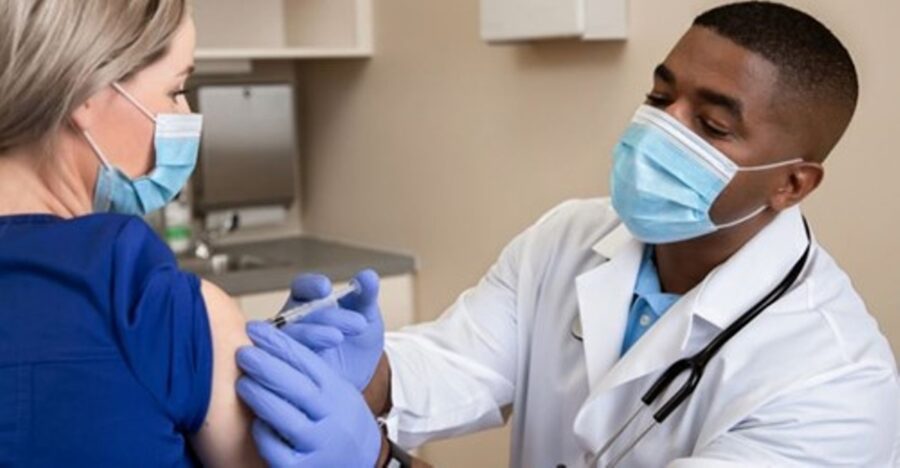
WHO to Make a Decision on Emergency Use Listing of AstraZeneca Vaccine
The World Health Organisation (WHO) is expected to decide on the emergency use listing of the AstraZeneca vaccine, for the two sites in India and the Republic of Korea, which will produce it for COVAX. The announcement comes after results showed that the two-dose regimen of the University of Oxford’s AstraZeneca vaccine offers minimal protection […]

The World Health Organisation (WHO) is expected to decide on the emergency use listing of the AstraZeneca vaccine, for the two sites in India and the Republic of Korea, which will produce it for COVAX.
The announcement comes after results showed that the two-dose regimen of the University of Oxford’s AstraZeneca vaccine offers minimal protection against mild-moderate COVID-19 infection from the 501Y.V2 or B.1.351 Coronavirus variant first identified in South Africa in November 2020.
South Africa has since put brakes on its rollout of the AstraZeneca COVID-19 vaccine, which arrived in the country last week.
New studies released by researchers in South Africa and the United Kingdom last week showed that the AstraZeneca vaccine is less effective against the mutated B.1.351, which would allow ongoing transmission of the inoculated populations.
According to the Wits Vaccines and Infectious Diseases Analytics (VIDA) Research Unit, in this study of about 2 000 volunteers where the median age was 31 years old, the mild disease was defined as at least one symptom of COVID-19.
However, protection against moderate-severe disease, hospitalisation or death could not be assessed in this study as the target population were at low risk.
During his opening remarks at the media briefing on COVID-19 on Monday, WHO’s Director-General, Dr Tedros Adhanom Ghebreyesus, said the agency was committed to using all available data to make those assessments.
“In the meantime, COVAX continues to prepare for its first-quarter distribution, and to add to its vaccine portfolio.”
Given the limited sample size of the trial and the younger, healthier profile of the participants, Ghebreyesus believes that it is vital to determine whether the vaccine remains effective in preventing more severe illness.
The Ministerial Advisory Committee Co-chair, Professor Salim Abdool Karim, said the overall efficacy of the AstraZeneca vaccine was 66% in the larger study including the United Kingdom, Brazil and South Africa.
However, when researchers zoomed into South Africa, the effectiveness diminished to 22%.
“That study that only looked at mild and moderate infections raise concerns not because we were expecting some diminishing activity, but it was the level in which it had diminished.”
He said government is unclear and uncertain about the efficacy of the jab in preventing hospitalisation and severe disease.
“We know from the overall trial that the AstraZeneca vaccine is effective against other pre-existing variants, we’re just not confident about its efficacy against the 501Y.V2.”
Government considering different proposals
The Professor said government is considering different proposals.
This includes rolling it out in a staggered manner, where only 100 000 people will receive the jab while monitoring the hospitalisation rate.
“If they’re below the threshold that we’re looking for then we’ll be confident that the vaccine is effective in preventing hospitalisation and then we can roll it out.”
Otherwise, if it is above the threshold, government needs to look at alternatives, he said.
“We don’t want to end up with a situation where we vaccinate a million people or two million people with a vaccine that may or may not be effective in preventing hospitalisation or severe disease.”
In the meantime, Karim said the rolling out of the AstraZeneca vaccine has been delayed until all processes are in place.
The WHO DG said the results are a reminder that the country needs to do everything they can to reduce the circulation of the virus with proven public health measures.
Manufacturers called to adjust to evolution of virus
In addition, Ghebreyesus is calling manufacturers to adjust to the evolution of the virus, taking into account the latest variants for future shots, including boosters.
“We know viruses mutate and we know we have to be ready to adapt vaccines so they remain effective.
“This is what happens with flu vaccines, which are updated twice a year to match the dominant strain,” he explained.
Tracking and evaluating variants
Meanwhile, Ghebreyesus said the WHO has mechanisms for tracking and evaluating variants of the virus that causes COVID-19.
“It’s vital that countries continue to report these variants to WHO, so we can coordinate global efforts to monitor their impact and advise countries accordingly.”
In addition, manufacturers need to scale up producing for vaccines to be distributed as quickly as possible to protect people before they are exposed to new variants, he recommended.
“We also need to continue designing and conducting new trials and we need to keep a close eye on the impact vaccines are having on epidemiology, severe disease and death so we can use vaccines to maximum effect.”
COVAX
COVAX has signed advanced purchase agreements with AstraZeneca and the Serum Institute of India and plans to distribute nearly 350 million doses in the first half of the year.
COVAX is expecting a decision this month from WHO on whether the vaccines will be granted emergency use listing as well as a recommendation on its optimal use.
“Should the emergency use listing be forthcoming, we expect the vaccine to play a key role in our effort to protect high-risk persons and to help end the acute phase of the pandemic.”
COVID-19 Vaccines Global Access, abbreviated as COVAX, is a global initiative aimed at equitable access to COVID-19 vaccines led by the Global Alliance for Vaccines and Immunisation, the World Health Organization, the Coalition for Epidemic Preparedness Innovations, and others. – SAnews.gov.za
